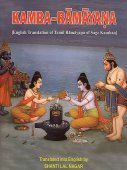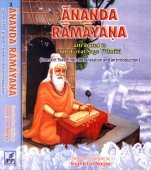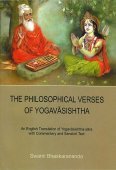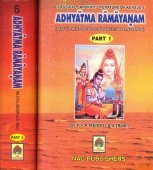Valmiki, Vālmīki, Vālmiki: 21 definitions
Introduction:
Valmiki means something in Buddhism, Pali, Hinduism, Sanskrit, the history of ancient India, Tamil. If you want to know the exact meaning, history, etymology or English translation of this term then check out the descriptions on this page. Add your comment or reference to a book if you want to contribute to this summary article.
In Hinduism
Vaishnavism (Vaishava dharma)
Source: ISKCON Press: GlossaryVālmīki (वाल्मीकि).—The author of the original Rāmāyaṇa, the original epic history about Lord Rāmacandra and Sītā, written by Vālmīki Muni.

Vaishnava (वैष्णव, vaiṣṇava) or vaishnavism (vaiṣṇavism) represents a tradition of Hinduism worshipping Vishnu as the supreme Lord. Similar to the Shaktism and Shaivism traditions, Vaishnavism also developed as an individual movement, famous for its exposition of the dashavatara (‘ten avatars of Vishnu’).
Purana and Itihasa (epic history)
Source: archive.org: Puranic Encyclopedia1) Vālmīki (वाल्मीकि).—A hermit who was the first among poets and the author of Rāmāyaṇa. General information. Knowledge about this hermit who was the first among the poets of Bhārata, is scanty. So we have to depend mainly on some hearsay for the life history of this sage. (See full article at Story of Vālmīki from the Puranic encyclopaedia by Vettam Mani)
2) Vālmīki (वाल्मीकि).—One of the prominent sons of Garuḍa. (Mahābhārata, Udyoga Parva, Chapter 101, Stanza 11).
Source: Cologne Digital Sanskrit Dictionaries: The Purana Index1a) Vālmīki (वाल्मीकि).—Originally born out of an ant-hill, born again of Carṣaṇī and Varuṇa. In his āśrama, Śītā was left when pregnant. There she gave birth to two sons whom the sage brought up;1 author of Rāma's story; of the family of Bhārgava;2 heard it from Nārada who got it from Brahmā.3 Vedavyāsa of the 26th dvāpara;4 present at Rāma's abhiṣeka.5
- 1) Bhāgavata-purāṇa VI. 18. 5; IX. 11. 10-11, 15; Brahmāṇḍa-purāṇa III. 36. 6.
- 2) Matsya-purāṇa 12. 51.
- 3) Ib. 53. 71-2.
- 4) Viṣṇu-purāṇa III. 3. 18.
- 5) Ib. IV. 4. 100.
1b) The father of Rohiṇi and Panavī.*
- * Vāyu-purāṇa 96. 161.
Vālmīki (वाल्मीकि) is the name of an ancient Pāśupata, according to the Skandapurāṇa (IV.54.12-74).—The Skandapurāṇa relates the legend associated with Piśācamocana thus: “Once, long ago, there was a devotee of Śiva named Kapardin. He established a liṅga outside Kāśī and built a kuṇḍa called Vimalodaka. A Pāśupata named Vālmīki began practising penance at the kuṇḍa. One day Vālmīki saw a terrible ghost. He asked the ghost how he came to that state. The ghost said that in the former birth he was a Brāhmaṇa staying in Pratisthāna on the Godāvarī. [...]”.

The Purana (पुराण, purāṇas) refers to Sanskrit literature preserving ancient India’s vast cultural history, including historical legends, religious ceremonies, various arts and sciences. The eighteen mahapuranas total over 400,000 shlokas (metrical couplets) and date to at least several centuries BCE.
Kavya (poetry)
Source: Shodhganga: A critical appreciation of soddhalas udayasundarikathaVālmīki (वाल्मीकि).—Name of a poet mentioned by Soḍḍhala in the kavipraśasti (eulogy of poets) of his Udayasundarīkathā;—The tradition assigns the authorship of the Rāmāyaṇa to a poet named Vālmīki. Rāmāyaṇa ends by relating Vālmīki as the author. There are a number of legends about Vālmīki but it is an established fiaet that he is the Ādikavi and that the Rāmāyaṇa is the Ādikāvya.
Soḍḍhala considers-himself as a descendant in the great line of poets commencing from the sage Vālmīki, the great primal poet. He refers to him in the Praśasti in four stanzas and puts him as the foremost of all the great poets in the line.
Source: Shodhganga: The Kavyamimamsa of RajasekharaVālmīki (वाल्मीकि) is the name of an important person (viz., an Ācārya or Kavi) mentioned in Rājaśekhara’s 10th-century Kāvyamīmāṃsā.—Which is another name of Prācetasa. Author of the Ādikāvya Śrimad Rāmāyaṇa. In the Kāvyamīmāṃsā of Rājaśekhara cited various ślokas from the Sundra-kānda and Kiṣkiṇdhā-kāṇda of Rāmāyaṇa.

Kavya (काव्य, kavya) refers to Sanskrit poetry, a popular ancient Indian tradition of literature. There have been many Sanskrit poets over the ages, hailing from ancient India and beyond. This topic includes mahakavya, or ‘epic poetry’ and natya, or ‘dramatic poetry’.
Natyashastra (theatrics and dramaturgy)
Source: Wisdom Library: Nāṭya-śāstraVālmiki (वाल्मिकि) is the name of a sage who was in the company of Bharata when he recited the Nāṭyaveda them, according to the Nāṭyaśāstra chapter 35. Accordingly, they asked the following questions, “O the best Brahmin (lit. the bull of the twice-born), tell us about the character of the god who appears in the Preliminaries (pūrvaraṅga). Why is the sound [of musical instruments] applied there? What purpose does it serve when applied? What god is pleased with this, and what does he do on being pleased? Why does the Director being himself clean, perform ablution again on the stage? How, O sir, the drama has come (lit. dropped) down to the earth from heaven? Why have your descendants come to be known as Śūdras?”.

Natyashastra (नाट्यशास्त्र, nāṭyaśāstra) refers to both the ancient Indian tradition (shastra) of performing arts, (natya—theatrics, drama, dance, music), as well as the name of a Sanskrit work dealing with these subjects. It also teaches the rules for composing Dramatic plays (nataka), construction and performance of Theater, and Poetic works (kavya).
General definition (in Hinduism)
Source: Apam Napat: Indian MythologyThe sage Valmiki is the composer of the epic poem Ramayana. He was the son of a sage named Prachetasa. While he was a young boy, he got lost in the forest, and was found by a hunter. The hunter brought him up like his son, giving him the name of Ratnakara. After the death of his adopted father, Ratnakara tried to support his family by hunting. However, as he could not make ends meet, he became a dacoit. He was notorious for his cruelty, for he would kill with impunity during his robberies.
Source: WikiPedia: HinduismVālmikī (वाल्मिकी): Maharishi Valmiki is the author of the Hindu epic Ramayana, a brahman by birth, connected with the kings of Ayodhya, contemporary of Rama who invented the shloka metre, who taught the Ramayana to Kusa and Lava.
In Buddhism
Tibetan Buddhism (Vajrayana or tantric Buddhism)
Source: Wisdom Library: Tibetan BuddhismVālmīki (वाल्मीकि) refers to one of the various Ṛṣis (sages) and Mahārṣis (great sages) mentioned as attending the teachings in the 6th century Mañjuśrīmūlakalpa: one of the largest Kriyā Tantras devoted to Mañjuśrī (the Bodhisattva of wisdom) representing an encyclopedia of knowledge primarily concerned with ritualistic elements in Buddhism. The teachings in this text originate from Mañjuśrī and were taught to and by Buddha Śākyamuni in the presence of a large audience (including Vālmīki).

Tibetan Buddhism includes schools such as Nyingma, Kadampa, Kagyu and Gelug. Their primary canon of literature is divided in two broad categories: The Kangyur, which consists of Buddha’s words, and the Tengyur, which includes commentaries from various sources. Esotericism and tantra techniques (vajrayāna) are collected indepently.
India history and geography
Source: Singhi Jain Series: Ratnaprabha-suri’s Kuvalayamala-katha (history)Vālmīki (वाल्मीकि) is the author of the Rāmāyaṇa, as mentioned by Uddyotanasūri in his 8th-century Kuvalayamālā (a Prakrit Campū, similar to Kāvya poetry) narrating the love-story between Prince Candrāpīḍa and the Apsaras Kādambarī.—The Kuvalayamala (779 A.D.) is full of cultural material which gains in value because of the firm date of its composition. [...] On pages 3.18-4.12, Uddyotanasūri gives the names of a number of Kathās and their authors, in Sanskrit, Prakrit and Apabhramsha, [i.e., Vyāsa and Vālmīki to whom we owe Bhārata and Rāmāyaṇa], [...]—That was the usual practice of all writers like Subandhu, Bāṇa, Daṇḍin, Haribhadra, Svayaṃbhū etc. We are able to know the names of about fifty works including romances. Dr. A. N. Upadhye has dealt with these in his paper entitled “Works and Authors referred to in the Kuvalayamālā of Uddyotanasūri” submitted to the A.I.O.C. Session at Gauhati.

The history of India traces the identification of countries, villages, towns and other regions of India, as well as mythology, zoology, royal dynasties, rulers, tribes, local festivities and traditions and regional languages. Ancient India enjoyed religious freedom and encourages the path of Dharma, a concept common to Buddhism, Hinduism, and Jainism.
Languages of India and abroad
Sanskrit dictionary
Source: DDSA: The practical Sanskrit-English dictionaryValmiki (वल्मिकि).—m., n. See वल्मीक (valmīka).
See also (synonyms): valmika.
--- OR ---
Vālmiki (वाल्मिकि) or Vālmīki (वाल्मीकि).—[valmīke bhavaḥ aṇ iñ vā] Name of a celebrated sage, and author of the Rāmāyaṇa; कवीन्दुं नौमि वाल्मीकिं यस्य रामायणीं कथाम् । चन्द्रिकामिव चिन्वन्ति चकोरा इव साधवः (kavīnduṃ naumi vālmīkiṃ yasya rāmāyaṇīṃ kathām | candrikāmiva cinvanti cakorā iva sādhavaḥ) || Udb. [He was a Brāhmaṇa by birth, but being abandoned by his parents in his childhood, he was found by some wild mountaineers who taught him the art of thieving. He soon became an adept in the art, and pursued his business of plundering and killing (where necessary) travellers for several years. One day he saw a great sage whom he asked on pain of death to deliver up his possessions. But the sage told him to go home and ask his wife and children if they were ready to become his partners in the innumerable iniquities that he had committed. He accordingly went home, but returned dismayed at their unwillingness. The sage then told him to repeat the word marā (which is Rāma inverted) and disappeared. The robber continued to repeat it for years together without moving from the place, so that his body was covered up with ant-hills. But the same sage reappeared and got him out, and as he issued from the 'valmika' he was called Vālmiki, and became afterwards an eminent sage. One day while he was performing his ablutions, he saw one of a pair of Krauncha birds being killed by a fowler, at which he cursed the wretch in words which unconsiously took the form of a verse in the Anuṣṭubh metre. This was a new mode of composition, and at the command of the god Brahman he composed the first poem the Rāmāyaṇa. When Sītā was abandoned by Rāma, he gave her shelter under his roof, and brought up her two sons. He afterwards restored them all to Rāma.]
Derivable forms: vālmikiḥ (वाल्मिकिः), vālmīkiḥ (वाल्मीकिः).
See also (synonyms): vālmīka.
Source: Cologne Digital Sanskrit Dictionaries: Shabda-Sagara Sanskrit-English DictionaryValmiki (वल्मिकि).—m.
(-kiḥ) An ant-hill; also valmīki .
--- OR ---
Vālmiki (वाल्मिकि).—m.
(-kiḥ) The author of the Ramayana; also vālmīki .
Source: Cologne Digital Sanskrit Dictionaries: Cappeller Sanskrit-English DictionaryVālmīki (वाल्मीकि).—[masculine] [Name] of an ancient Ṛṣi, the author of the Rāmāyaṇa, etc.
Source: Cologne Digital Sanskrit Dictionaries: Aufrecht Catalogus Catalogorum1) Vālmīki (वाल्मीकि) as mentioned in Aufrecht’s Catalogus Catalogorum:—Quoted in Taittirīyaprātiśākhya 5, 36. 9, 4. 18, 6.
2) Vālmīki (वाल्मीकि):—Rāmāyaṇa. Verses from it Śp. p. 84. [Subhāshitāvali by Vallabhadeva] Gaṅgāṣṭaka, not in Rāmāyaṇa.
3) Vālmīki (वाल्मीकि):—pupil of Nityanātha: Jātakavarṣapaddhati.
Source: Cologne Digital Sanskrit Dictionaries: Monier-Williams Sanskrit-English Dictionary1) Valmiki (वल्मिकि):—[from valmī] m. n. an ant-hill, [cf. Lexicographers, esp. such as amarasiṃha, halāyudha, hemacandra, etc.]
2) Vālmīki (वाल्मीकि):—[from vālmīka] m. (incorrectly vālmiki) Name of the celebrated author of the Rāmāyaṇa (so called, according to some, because when immersed in thought he allowed himself to be overrun with ants like an anthill; he was no doubt a Brāhman by birth and closely connected with the kings of Ayodhyā; he collected the different songs and legendary tales relating to Rāma-candra and welded them into one continuous poem, to which later additions may have been made; he is said to have invented the Śloka metre, and probably the language and style of Indian epic poetry owe their definite form to him; according to one tradition he began life as a robber, but repenting be took himself to a hermitage on a hill in the district of Banda in Bundelkund, where he eventually received Sītā, the wife of Rāma, when banished by her husband; cf. [Indian Wisdom, by Sir M. Monier-Williams 314; 315 etc.]), [Mahābhārata; Rāmāyaṇa] etc.
3) [v.s. ...] of a son of Garuḍa, [Mahābhārata]
4) [v.s. ...] of a grammarian, [Taittirīya-prātiśākhya]
5) [v.s. ...] Name of the authors of various works (the Yoga-vāsiṣṭha, the Adbhuta-rāmāyaṇa, and the Gaṅgāṣṭaka), [Catalogue(s)]
6) [v.s. ...] (with kavi) of the son of Rudra-maṇi Tri-pāṭhin and author of the Ramalendu-prakāśa, [ib.]
Source: Cologne Digital Sanskrit Dictionaries: Yates Sanskrit-English Dictionary1) Valmiki (वल्मिकि):—(kiḥ) 2. m. An ant-hill.
2) Vālmiki (वाल्मिकि):—(kiḥ) 2. m. The author of the Rāmāyana.
Source: DDSA: Paia-sadda-mahannavo; a comprehensive Prakrit Hindi dictionary (S)Vālmīki (वाल्मीकि) in the Sanskrit language is related to the Prakrit word: Vammīha.
[Sanskrit to German]
Sanskrit, also spelled संस्कृतम् (saṃskṛtam), is an ancient language of India commonly seen as the grandmother of the Indo-European language family (even English!). Closely allied with Prakrit and Pali, Sanskrit is more exhaustive in both grammar and terms and has the most extensive collection of literature in the world, greatly surpassing its sister-languages Greek and Latin.
Kannada-English dictionary
Source: Alar: Kannada-English corpusVālmīki (ವಾಲ್ಮೀಕಿ):—
1) [noun] a snake that dwells in an ant-hill.
2) [noun] the sage poet who authored the great Indian epic Rāmāyaṇa.
Kannada is a Dravidian language (as opposed to the Indo-European language family) mainly spoken in the southwestern region of India.
Tamil dictionary
Source: DDSA: University of Madras: Tamil LexiconVālmīki (வால்மீகி) noun < Vālmīki. A sage, the author of the Rāmāyaṇa; வடமொழியில் இராமாயணமியற்றிய முனிவர். [vadamozhiyil iramayanamiyarriya munivar.] (W.)
Tamil is an ancient language of India from the Dravidian family spoken by roughly 250 million people mainly in southern India and Sri Lanka.
See also (Relevant definitions)
Starts with: Valmiki kavi, Valmikicarita, Valmikihridaya, Valmikishiksha, Valmikisukti, Valmikisutra, Valmikitatparyatarani, Valmikiya.
Ends with: Kavivalmiki.
Full-text (+681): Kaviramayana, Valmika, Ramayana, Adikavi, Adyakavi, Kushivasha, Kavijyeshtha, Pracetasa, Kushin, Kavivalmiki, Adbhutaramayana, Mularamayana, Valmikiya, Yogindra, Vanmiki, Atikaviyam, Maitravaruni, Kavi, Kavindu, Munisha.
Relevant text
Search found 85 books and stories containing Valmiki, Vaalmeegi, Valmigi, Vālmīki, Vālmikī, Vālmiki, Valmīki; (plurals include: Valmikis, Vaalmeegis, Valmigis, Vālmīkis, Vālmikīs, Vālmikis, Valmīkis). You can also click to the full overview containing English textual excerpts. Below are direct links for the most relevant articles:
Satirical works of Kshemendra (study) (by Arpana Devi)
8. Reverence for Vyāsa and Vālmīki < [Chapter 2 - Kṣemendra: His Life and Works]
Puranic encyclopaedia (by Vettam Mani)
Formal Education System in Ancient India (by Sushmita Nath)
Subjects studied in the Epic Period < [Chapter 5 - Subjects studied in the Vedic and Buddhist period]
The Gurukula centre of learning < [Chapter 3 - Centres of Learning in Vedic and Buddhist Period]
Education in the Epic Period < [Chapter 1 - Introduction]
Kavyamimamsa of Rajasekhara (Study) (by Debabrata Barai)
Part 2.2 - Creation of Kavi (Poet) in the Kāvyamīmāṃsā < [Chapter 5 - Analyasis and Interpretations of the Kāvyamīmāṃsā]
Part 7.5 - Poetic conventions regarding to the Trees and Plants < [Chapter 5 - Analyasis and Interpretations of the Kāvyamīmāṃsā]
Part 8.8 - Region of Madhyadeśa (central part) < [Chapter 5 - Analyasis and Interpretations of the Kāvyamīmāṃsā]
Yoga Vasistha [English], Volume 1-4 (by Vihari-Lala Mitra)
Chapter III - On the repeated creations of the world < [Book II - Mumukshu khanda (mumukshu-vyavahara khanda)]
Chapter CCXV - Eulogy on this work and the mode of its recital < [Book VII - Nirvana prakarana part 2 (nirvana prakarana)]
Hanuman Nataka (critical study) (by Nurima Yeasmin)
Related products
(+3 more products available)





